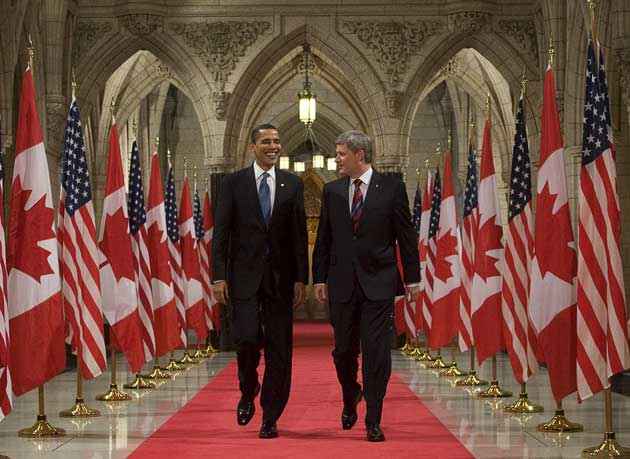Obama arrives in Canada with immigration, economics and environment on the agenda

There was snow on the ground in Ottawa yesterday as Air Force One touched down for Barack Obama's deliberately low key, first trip abroad as president.
In a moment replete with symbolism, Mounties in red uniforms gave the salute as Mr Obama was greeted by Canada's Governor General, Haitian born Michaëlle Jean. It was meant to be perfunctory encounter between Canada's acting head of state (in the Queen's absence) and the president, but it turned instead into a lengthy closed door session between the two black political leaders.
Mr Obama is interested in the success of Canada's immigration model and he was learning first hand from a woman whose family fled Haiti as refugees from the regime of Dictator Francois "Papa Doc" Duvalier.
Canada's Prime Minister, Stephen Harper was kept cooling his heels at his office in Ottawa while awaiting his celebrity guest. Soon Mr Obama was being spirited in his armoured limousine, with two helicopters flying protectively overhead, for a meeting with the equally young Mr Harper who has sharply conservative political views.
Pomp and circumstance was at a minimal as Mr Obama arrived amid cheering crowds, all kept at such a distance they could barely glimpse him. Mr Obama gave a quick wave to the crowd before signing two visitor's books and getting down to business with Mr Harper.
The White House has been anxious to play down Mr Obama's celebrity appeal, when millions of Americans are going through extreme economic hardship.
Yesterday's encounter was focused on getting the engines driving North America's economy turning again and avoiding a disastrous bout of protectionism. The media was excluded from all the meetings and in the one press availability only four questions were permitted. Two from Canadian journalists and two from the US side.
More controversially for Canada, Mr Obama has committed himself to taking the lead on climate change and sharply reducing US oil consumption. Doing that runs the risk of economic ruin for its northern neighbour which is now a major oil exporting power.
Mr Harper's government was closely allied with former president George Bush in minimising the need for a climate change deal and even backed away from the Kyoto treaty. It has flatly rejected limits on emissions from its own industry.
That was not the spin Mr Harper was putting on things ahead of yesterday's meeting. He told an US interviewer: "In Canada, we've been wrestling for the last decade or so with our desire... to diminish our own carbon emissions. But we've been trying to do so in an integrated economy when the United States has not been willing to do so. I think quite frankly the fact that we have a President and an administration that wants to see some kind of regulation on this is an encouragement."
In the past four years Canada's exports of crude oil have rocketed making it highly dependent on the revenue. The recent collapse in oil prices is tipping the country into a steep recession and any talk of limiting oil exports to the US, to fight global warming is deeply unsettling to the Ottawa government.
Canada's "oil patch" in Alberta relies on tar sands and it emits far more greenhouse gases other forms of drilling.
Another serious problem for Canada is the death spiral of the US car manufacturing industry which has suppliers on both sides of the border. More than seven million jobs are at stake from cross border trade and there are increasingly shrill calls for protectionism in the US congress.
This is deeply worrying to Ottawa which has seen the national jobless rate rise to 7.2% and a once robust economy shrink. The Harper government is fighting the downturn with its own stimulus plan costing C$39 billion over two years.
Over a working lunch yesterday, Mr Obama and Mr Harper looked for common ground, weighing the environmental costs of extracting oil from tar sands with the badly needed economic benefits. Both sides are interested in a so-called cap-and-trade emissions system that allows companies to buy and sell permits for the greenhouse gases they spew into the atmosphere.
Subscribe to Independent Premium to bookmark this article
Want to bookmark your favourite articles and stories to read or reference later? Start your Independent Premium subscription today.

Join our commenting forum
Join thought-provoking conversations, follow other Independent readers and see their replies